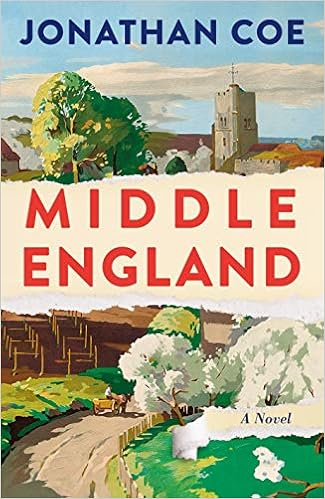Middle England by Jonathan Coe
 Middle England is the third book in Jonathan Coe's trilogy centred on Benjamin Trotter. We first met Benjamin as a grammar school boy in 1970s Birmingham in The Rotters' Club. Now in his mid-50s, Benjamin has finally abandoned hope of a relationship with Cicely, the object of his teenage affections, and is still working on his endlessly complicated, rambling literature-cum-music project which seems destined never to be completed. Meanwhile, his sister Lois is wondering if she'll ever come to terms with the terrible trauma she suffered in The Rotters' Club, and his niece Sophie, an art historian, has found love - or has she?
Middle England is the third book in Jonathan Coe's trilogy centred on Benjamin Trotter. We first met Benjamin as a grammar school boy in 1970s Birmingham in The Rotters' Club. Now in his mid-50s, Benjamin has finally abandoned hope of a relationship with Cicely, the object of his teenage affections, and is still working on his endlessly complicated, rambling literature-cum-music project which seems destined never to be completed. Meanwhile, his sister Lois is wondering if she'll ever come to terms with the terrible trauma she suffered in The Rotters' Club, and his niece Sophie, an art historian, has found love - or has she?Middle England, set in the build-up to and aftermath of the Brexit referendum, is a somewhat wistful, bittersweet state-of-the-nation novel, beginning with the death of Benjamin's mother and Gordon Brown on the campaign trail calling a woman a bigot for being - well, let's face it, a bigot. The title doesn't just refer to a demographic: it's also very much rooted in the British Midlands, with journeys described in gentle litanies of place names and road numbers and a poignant description of a visit with Benjamin's elderly father to the site of the former Longbridge Rover plant where he used to work.
This is a novel in which the political plays out through the personal. The warring factions of the Labour Party are here in the form of centre-left journalist Doug Anderton, the son of a working classe trade unionist, and his appalling middle-class Corbynista daughter Coriander. Brexit sees Sophie and and her husband Ian attend marriage counselling, with Sophie believing Ian's Leave vote reveals 'that his basic model for relationships comes down to antagonism and competition' and Ian claiming that Sophie's support for Remain gives her 'an attitude of moral superiority'. What's interesting about both their answers, their counsellor muses, is that neither of them mentioned politics. It's almost 'as if the referendum wasn't about Europe at all. Maybe something much more fundamental and personal was going on, Which is why this might be a difficult problem to resolve...'
Middle England covers some huge topics, and yet it's a quiet, understated sort of novel. Like most of Jonathan Coe's work it's acutely observant and at very funny indeed - Doug's meetings with Nigel, a Tory special adviser, are particularly entertaining, as is the terrible cruise that Ian enjoys so much more than Sophie - and it has a warmth to it that I appreciated, as well as a satisfying, if not wholly plausible conclusion. Coe is probably my favourite contemporary novelist and while I don't think Middle England is his best book, the competition there is stiff: this is still better than most the work of most writers and one of my favourite books of the year.
Comments
Post a Comment